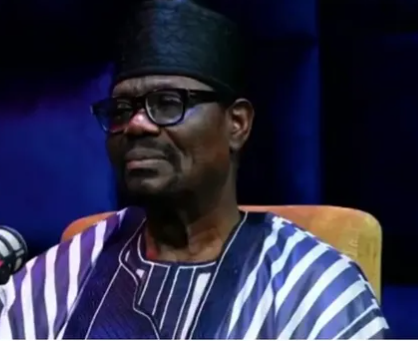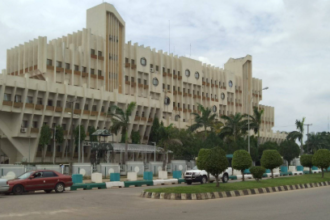By Isaac Okoro
LAGOS, NIGERIA – In a scathing indictment of the current state of affairs, veteran journalist and former Chairman/Managing Director of Daily Times of Nigeria, Chief Tola Adeniyi, has declared that Nigeria has “come to the end of the road” and that it appears as though “there is no government at all in the country.”
Chief Adeniyi made these remarks while serving as a Guest Speaker on the “Boiling Point Arena,” a monthly interview program hosted by Dr. Ayo Arowojolu and broadcast live on six radio stations across Lagos, Ogun, and Delta States on Sunday night. The program, also streamed via Zoom, focused on “The Legislature and the Waning Principle of Checks and Balances in Nigeria” and was chaired by Olówu of Owu Kingdom, Oba Prof Saka Matemilola.
Adeniyi laid blame for the nation’s current issues on the military’s “Kakistocracy,” a system he believes has masqueraded as democracy and concentrated excessive power in the hands of the president. He argued that this flawed system has rendered the Legislature powerless, turning them into mere “lapdogs” of the Executive branch.
“We have a military dictatorship constitution which made President Bola Tinubu almost as powerful as God,” Adeniyi stated, highlighting the President’s extensive appointment powers. “Because he is so powerful, the Legislature, which is supposed to be the most important arm of government, has been pocketed by Mr. President to do his bidding.”
He further criticized the current crop of legislators, suggesting they are primarily driven by self-interest and lack the quality leadership needed to effectively check the Executive’s power. He pointed to the ongoing insecurity in the country, arguing that a serious Legislature would have long enacted laws to empower citizens to defend themselves.
According to Chief Adeniyi, two key factors contribute to Nigeria’s current “rudderless state”: the absence of disciplined political parties with clear ideologies and the widespread compromise across various aspects of national life. He lamented the decline from the era of UPN, NPN, GNPP, NPP, and PRP, which he described as having responsible and respectable leadership. Today’s parties, he suggested, are driven by personal gain rather than public service.
He also cited a “dearth of the judiciary and civil societies,” coupled with a “compromised armed forces, very, very compromised security services and the police” and a frustrated and alienated citizenry as contributing factors to the ineffectiveness of the legislature.
As a solution, Chief Adeniyi advocated for restructuring Nigeria along ethnic lines, allowing respective regions and nationalities to govern themselves according to their own cultures and traditions. He proposed that each nationality should develop its own constitution based on its unique heritage.
“So, let the Yoruba man be the Yoruba nation…Let the Igbo be forever Republican…In other words, we must have home-grown means of controlling ourselves.” He concluded, “I will submit that the solution for now is that every nationality in Nigeria…should go their separate ways and begin to form their government according to their cultural tradition. If after a hundred years, two hundred years, they…can still come together and stay in a place they called Nigeria, so be it.”
Chief Adeniyi’s comments add to a growing chorus of voices expressing concern over the direction of Nigeria and calling for significant reforms to address the country’s myriad challenges. His call for a potential restructuring is likely to fuel further debate about the future of the nation.









